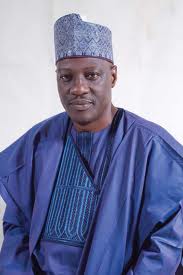Redefining style of governance in Ahmed's Kwara

Governor Ahmed Abdulfatah's revolutionary scheme of measuring the performance of civil servants in Kwara State through stated indicators aims to boost the productivity of the state and consolidate the relationship between the government and the people.
Abdulfatah's new plan of appraisal for public servants and agencies is bound to shake up many concepts in his native Kwara State which until recently was regarded as a civil service state.
Like the trend in virtually every segment of the public service across the country, performance has been of little consideration in assessment. Kwara until now was not an exception to the Nigerian philosophy that the civil service is not my papa's business.
It is against the backdrop that the Kwara State government, in addition to the rules of civil service engagement, recently introduced a new Performance Contract, PEC, for its public servants.
The concept, which is a brainchild of Governor Abdulfatah, aims to improve the performance of public organisations and officials based on published performance indicators, critical success factors and resource availability.
It also entails affected officials agreeing to a set of indices against which their performance will be measured as well as the clear division of roles and responsibilities.
In addition, it makes agencies to commit to specific standards of service delivery. Given that these targets are to be published, they also provide a chance to implement participatory governance. Ahmed signaled his determination to pursue this concept of governance at a recent policy retreat in Lagos.
The event which was attended by the state Deputy governor, Elder Peter Kishira, Secretary to the State Government, Alhaji Isiaka Gold, Chief of Staff Government House, Alhaji Toyin Sanusi, among others was an avenue to identify key policy thrusts for the administration and design key performance indicators.
Speaking at the event, Ahmed restated his determination to drive governance from an empirical perspective, to ensure that the business of governance is based on a solid foundation of planning but also ensure that all stakeholders within and outside government have a clear understanding of policy objectives and the path to their attainment.
Accordingly, he observed that, "The road map identified for all Ministries Departments and Agencies in the state formed the basis of a Medium Term Sector Strategy (MTSS) which contained key policy strategies and programs of the administration for the next four years. It also forms the basis of budgeting."
However, in what appeared like a test run for the new approach to governance in the state, Ahmed recently directed his commissioners to breakdown the budget provisions into action plans for the next two quarters which would not only form the basis for their assessment but also for communicating proposed capital projects to the public.
Expatiating on this, Ahmed stressed the need to deliver effective governance on a timely and efficient basis. He, however observed, that the benefits of the reforms might not come, without the contributions of concerned stakeholders.
To this end, Ahmed directed the Head of Service to supervise the delineation of measurable deliverable for each ministry.
Continuing, Ahmed said his administration is driven by a desire to ensure that service delivery is optimised and that the people's expectations are met on a timely basis. Consequently, he announced the government's intention to introduce Monitoring and Evaluation as part of performance contracting.
Under the scheme, he said all inputs, outputs and outcomes of all policies, programs and projects will be monitored and evaluated to ensure compliance with set targets and objectives.
Speaking on this development in the state, Senior Special Assistant to the Governor on Media and Communications, Dr. Muyideen Akorede, reaffirmed Ahmed's determination to drive governance through private sector-oriented policies which emphasise empirical planning, clear delineation of duties and responsibilities, measurable deliverables and performance appraisals.
Akorede said this is evident in the calibre of Ahmed's cabinet, which comprised of technocrats with diverse backgrounds and experience.
"For example, while swearing in his first set commissioners, Ahmed told the newly-appointed aides that their performance will be constantly evaluated through published performance indicators and peer review mechanisms.
He told the appointees that in view of the public's high expectations of the administration, the commissioners had to meet and exceed their expectations based on the road map outlined in the MTSS.
Ahmed also directed the state ministry of information to ensure the MTSS was fully internalised and understood by all segments of the state's population," Akorede noted.
Explaining further on the performance contracting system, he said, "What the scheme implies is that, each public official from commissioners downwards will agree a job schedule and action plans for a specified period with their superiors based on set criteria and resources.
Once agreed these indices will form the basis for measuring performance and ensuring that service delivery becomes more efficient and empirical across the spectrum."
Cloud Tag: What's trending
Click on a word/phrase to read more about it.
CUTI Rotimi Atere Najim Yaasin Sulyman Tejidini Ibrahim Abiodun Mohammed Lawal Bagega Borgu Olumide Daniel Ibitoye Aiyedun Saudat Abdulbaqi Moro Lawal Jimoh Ajeigbe Government House Ohoro Of Shao Olayinka Olaogun Ishola Moses Abiodun CCT RTEAN Col. Taiwo Gbenga Awoyale NIRSAL Alapansapa Sarakite Radio SBS Akande Idowu Ayoola Muhammed M.Y. Abdulrahaman Yoruba Lateef Alagbonsi Adamu Jemilat-Baki Nigeria Customs Service Riskat Opakunle Wasiu Onidugbe Moremi High School Abdulrahman Abdullahi Kayode Y.A. Abdulkareem Hamid Bobboyi KW-GIS Ndakene Sulyman Age AbdulKareem Plat Technologies Limited Kunle Suleiman Azeez Bello KWAFFA Timothy Akangbe David Adesina Yinka Aluko Ibrahim Gambari Oyun Oye Tinuoye Amusa Bello Aishatu Ahmed Gobir Federal Allocation Abioye Bello Jimoh Lambe Abdulkareem Mohammed Abdulahi Susan Modupe Oluwole Ilorin West Apata Ajele Secondary School Oniwasi Agbaye Alaro Atiku Abubakar Egbejila Shuaib Olarongbe PPS Fatai Olodo Share Sheikh Ridhwanullah Hausa Olosi Of Osi John Kehinde Salako Eghe Igbinehin Danhawa Tunde Akanbi Saduki Lafiagi Yahaya Oloriegbe Kayode Bankole


